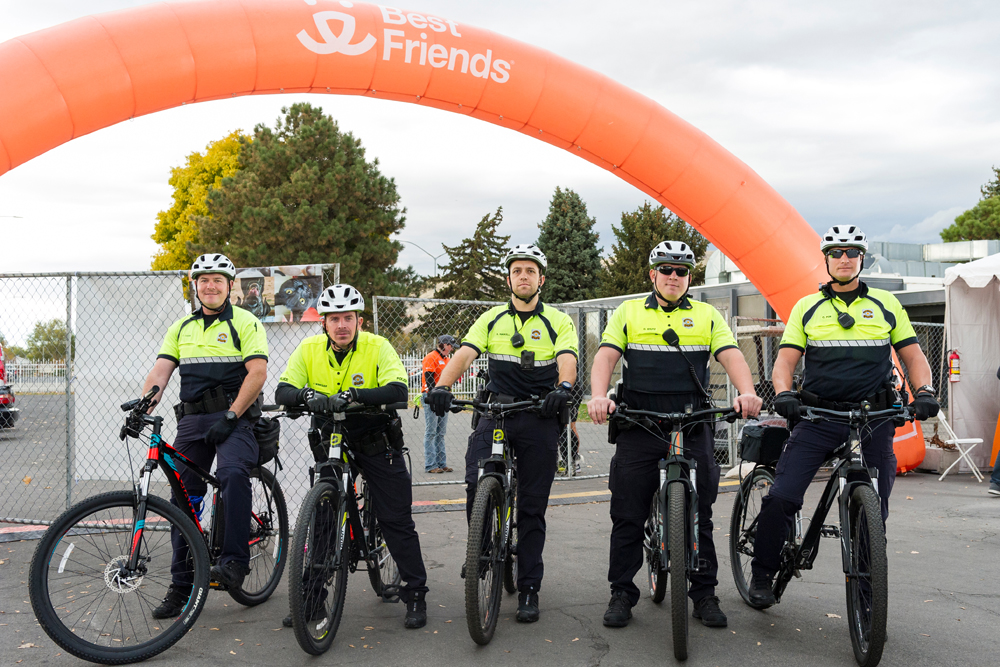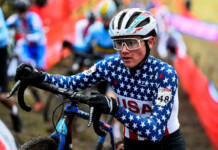By Turner Bitton — In mid-July of last year, Salt Lake City re-established a bicycle patrol squad on the city’s west side to patrol the neighborhoods of Rose Park, Poplar Grove, and Glendale. Area residents greeted the news with enthusiasm and excitement. As many readers may know, Salt Lake City has had bicycle squads for years and the west side COP bicycle squad is not so much new as it is redeployed to assist with the city’s efforts to improve coverage and support for west side neighborhoods. Coupled with the opening of a new police sub-station on North Temple the new squad represented a celebrated increase in resources for west side communities.

Research conducted in communities across the country has shown that bicycle squads are associated with improved civilian-officer relations (Menton, 2007), cost savings, faster officer response times, and environmental benefits (Vonk, 2003). The average fully-equipped police bicycle costs roughly $1,200 and has very little maintenance when compared to vehicles yet bicycles can respond more effectively to areas throughout the west side that patrol vehicles cannot. This includes areas along the Jordan River, the numerous alleys and walkways, and inside of the many housing complexes.
Cycling West spoke with Officer Clinton Fox, a member of the west side bicycle squad to hear about the past year of work for the bicycle squad. Below is a transcript of the interview with Officer Fox:
CW: First of all, what is your position with the bike squad? How long have you been with Salt Lake City Police Department?
OF: I have been with the Salt Lake City Police Department for 3 years, but I have been in law enforcement for over 10 years. With regards to the bike squads, there are only officers and supervisors. I have been with bikes for over a year and am not a supervisor.
CW: After a year of operation on the west side is there anything unique about being in the bike squad on the west side?
OF: This squad has some very unique issues to deal with. On the west side, we have the Jordan River Trail, Gateway Inn project area, as well as some of the highest rates of drive-by shootings.
Being on a bike gives us the opportunity to patrol the trail and give much-needed attention to areas that are used by all types of people but that are hard to get to using normal patrol techniques. While riding a bike you become much more a part of your surroundings making us more approachable and more involved. Being on the bike squads we are responsible for helping some of the other specialty units in the department. Some of our plainclothes officers utilize us because of our flexibility and it is often essential to have uniformed officers present during some of their operations. Another benefit of us being so flexible is that when we have spikes in specific crimes, like drive-by shootings or any other conceivable crime, we make those areas our priority and we can patrol either in our cars or on bikes making us very versatile.
Another unique aspect of this squad is that we are each assigned a target area. We are responsible for meeting with and creating a dialogue between us and the different businesses in that area. This gives the owners/managers a one on one opportunity to give us their complaints and to hear their feedback regarding what they see as the major problems facing their community.
CW: What’s it like to commute by bike as a law enforcement officer? Does it make the job significantly different than in a patrol vehicle?
OF: Without a doubt being on a bike is harder than being inside a patrol car. If doing police work was easier on a bike, everyone would be on bikes.
The obvious reasons are that you have to pedal everywhere you go. Do this with body armor, a duty belt, and all the other essential gear we must carry makes it a little bit more difficult. With that being said, we do limit ourselves to only taking calls within a limited area, and we are non-call responsive meaning that we are not the first in line to get dispatched to calls in any zones. It is our responsibility to listen to the radio and we self-dispatch to any call that it is within our capabilities to adequately handle.
Like I mentioned earlier though. Being on our bikes forces us to blend into the public. We interact with people at a much higher rate than simply passing through a neighborhood in a car. We ride with people walking and talk to them and try to be as engaging as possible. We stop at crosswalks and intersections and flow with the everyday foot traffic that is passing through our areas. This is, in my opinion, one of the best parts about being on any bike squad.
CW: Is there anything that sticks out in your mind as one of the successes of the bike squad?
OF: I believe the major successes of this COP Squad has been the interaction that we have had in the Gateway Inn area of North Temple. This has been one of our biggest targeted enforcement areas and we have had some major success with stemming the flow of narcotics and prostitution. Being on our bikes has put us on a face to face basis with many of the locals. I have spoken with many of the shop owners/management and they have thanked us for our presence in their neighborhood. Our continued presence in this area has forced many of the dealers to move to other areas and we are forcing them to adapt to us.
OF: Our constant presence in the area of the Gateway Inn, coupled with the many arrests in the same area has had a very positive influence on the neighborhood. We are constantly battling the epidemic of narcotics in this area, but we are seeing positive effects from our operations.
CW: Lastly, is there anything you’d like readers to know about the bike squad or law enforcement more broadly?
OF: My personal take on the bike squad is that we have to be different than your everyday beat cops. I believe that all cops need to be approachable. But when you roll up on a mountain bike people look at you different, they treat you different. In a good way. I have high-fived more random people on my bike than at any time before. I have had conversations with people walking on sidewalks that left both them and me laughing for really no reason. People approach us for directions, or even dining suggestions believing that we must know where all the best food is. Being on the bike squads is an opportunity to represent your department in a way that just driving by and waving will never accomplish. It’s a way to really connect and be one with the community that you serve and to give special attention to areas like parks or biking trails that otherwise go un-serviced for the most part.
Our bike squad wears all the protective equipment we can. Bright yellow shirts, helmets, gloves, lights on the bikes. But it is still very dangerous. Riding through downtown, crossing North Temple or Redwood Road, or doing everyday cop stuff like foot pursuits or even traffic stops (we have recovered at least two separate occupied stolen cars while on our bikes) we have to be aware that we are at the mercy of every moving vehicle around us. Our situational awareness has to be high when working on a bike. Bike safety and training is extremely important and takes the awareness of not just us but all motorists.
Lastly, I would like to thank your readers. Being a police officer is 100% about service. We would not be here without the support of the public we serve. It is my honor to work for such a great police department and to serve such a wonderful community. I have worked for several police agencies in Utah and SLCPD is by far the greatest department to work for. The people of Salt Lake City are incredible, and it is amazing the love and support they show for us and all first responders. I would like to say thank you to the citizens of Salt Lake City for allowing me to serve them.
References:
- Menton, C. (2007). Bicycle patrols: an underutilized resource. Law and Order.
- Vonk, K. (2003, April). Bike Patrol Case Studies: Ann Arbor and Univ of Michigan. Law and Order.
Turner C. Bitton is an avid cyclist and is well-known for his commitment to public service. He lives in the Glendale neighborhood of Salt Lake City with his husband Chase and their two dogs Charley and Moose.






